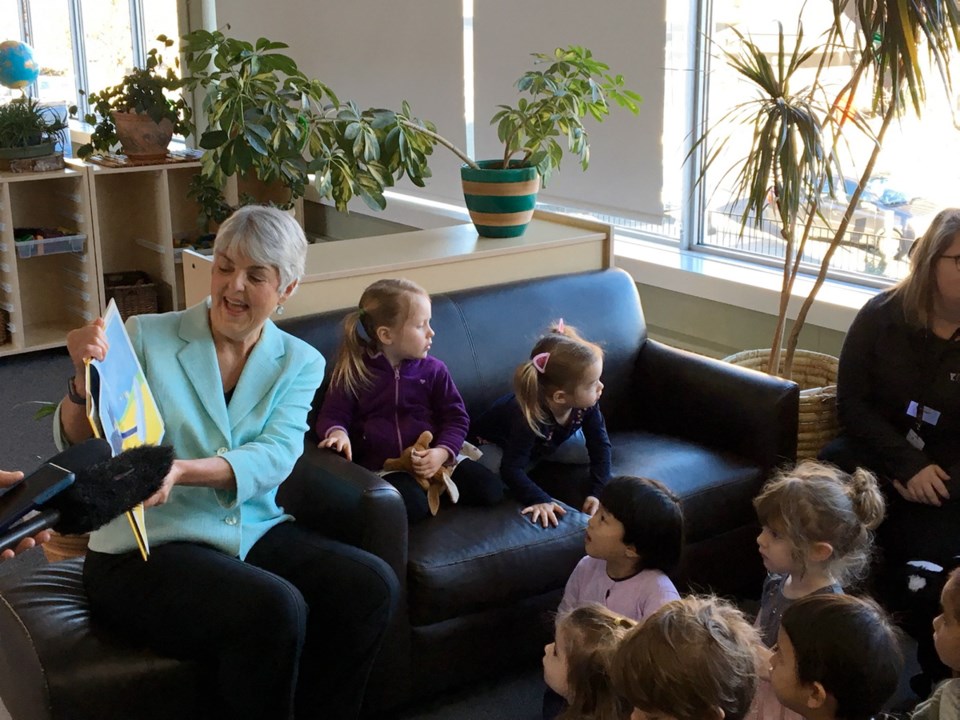Parents dreaming of $10-a-day child care will likely see their infants and toddlers enter middle school before that happens.
The B.C. government announced a new child care benefit for families and an incentive for child care providers to lower fees but admitted that its election promise of universal child care will take up to a decade to become a reality.
However, child care advocates are applauding the investment, calling it a major step in making daycare more affordable.
Starting this September, parents who have children under three and make less than $111,000 will be eligible for a new child care benefit of up to $1,250 per child. Older children will not be eligible for the benefit until 2020.
Families with an annual household income of less than $45,000 will pay "little to nothing" for licensed child care, promised Finance Minister Carole James.
Families in this income bracket will receive up to $1,250 a month for infants, with the benefit decreasing for toddlers and school-age children.
Families who earn between $60,000 and $79,999 will receive $910 a month per child for infant care and less the older the child gets.
The government said the benefits will be higher and help more families — 86,000 compared with 26,000 families — than the existing child care operating fund.
The child care benefit will cost the government $630 million over three years.
Currently, the average family on southern Vancouver Island pays $1,000 a month for child care, which translates to $50-a-day based on 20 working days.
Sharon Gregson, of the advocacy group $10 a Day Child Care, called the funding "a victory for families."
“This is a very meaningful first step today and we’re very pleased that families will see meaningful changes,” Gregson said. “They’ll see affordability, they’ll see new spaces, there will be investment in the workforce.”
Gregson said her group will pressure the government to continue its commitment to universal child care beyond the three-year funding commitment.
“That’s why we’re here today, because parents across the province spoke up and said that child care is a crisis … and that's what we saw government respond to today,” Gregson said.
The benefits represent “a giant step forward in terms of helping families, helping women, helping children and boosting the economy,” said Iglika Ivanova of the Canadian Centre for Policy Alternatives, which outlined a plan to reach the $10-a-day goal. “We know that child care has a really big economic impact by allowing more mothers to work.
“This is the first major new social program introduced in this province in over a generation.”
James vowed that the $10-a-day promise is more than an election slogan.
“We are continuing to work on the program and it will roll out over the next 10 years,” she said.
The budget, James said, “marks the beginning of a made-in-B.C. universal child care program. It’s going to take time to deliver and that’s why we’re starting right away in a big way.”
The government is also offering money to child care providers as an incentive to reduce costs.
Starting in April, licensed child care providers will be able to apply for up to $350 a month per child care space in order to reduce fees.
James said licensed providers that receive the money will have to sign a contract promising not to increase their fees after receiving the cash.
The government also pledged $237 million over three years to create 22,000 new licensed child care spaces by working with municipalities, school districts and not-for-profits.
The government will also incentivize daycares to expand their operating hours to help parents who work shift work or outside of standard business hours.
The government gave most of the benefits to licensed child care providers, and said it will help unlicensed daycare providers become licensed.
University of Victoria political analyst Michael Prince said the commitment to child care was "a bigger, bolder step than I thought I was going to see for the first three years."
The investment, Prince said, shows that B.C. is “on the pathway to a more public, accessible, universal early learning childhood system.”
"As a budget on social policy, this is the most ambitious I've seen since the 1970s in this province," Prince said.
In outlining its 10-year plan for universal child care, the province says it is working with the federal government, which is providing $153 million over three years, to launch pilot projects for reduced-cost child care for families of any income.



